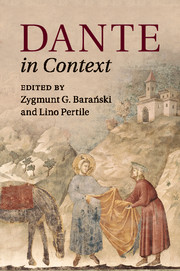Book contents
- Frontmatter
- Dedication
- Contents
- List of illustrations
- List of maps
- Notes on contributors
- Chronology
- Abbreviations and note on translations
- Introduction
- Part I Politics and society
- Part II Intellectual traditions
- Part III Linguistic and literary cultures
- 15 Linguistic Italy
- 16 Education
- 17 Rhetoric, literary theory, and practical criticism
- 18 Classical antiquity
- 19 Religious culture
- 20 Visions and journeys
- 21 Historical and political writing
- 22 Vernacular literatures
- 23 Popular culture
- Part IV Visual and performative culture
- Part V Dante: life, works, and reception
- Further reading
- Index
21 - Historical and political writing
from Part III - Linguistic and literary cultures
Published online by Cambridge University Press: 05 October 2015
- Frontmatter
- Dedication
- Contents
- List of illustrations
- List of maps
- Notes on contributors
- Chronology
- Abbreviations and note on translations
- Introduction
- Part I Politics and society
- Part II Intellectual traditions
- Part III Linguistic and literary cultures
- 15 Linguistic Italy
- 16 Education
- 17 Rhetoric, literary theory, and practical criticism
- 18 Classical antiquity
- 19 Religious culture
- 20 Visions and journeys
- 21 Historical and political writing
- 22 Vernacular literatures
- 23 Popular culture
- Part IV Visual and performative culture
- Part V Dante: life, works, and reception
- Further reading
- Index
Summary
Clio has seldom if ever been wholly indifferent to social relations involving authority or power. At some level the writing of history is at least likely to embody some political agenda, while a discussion of politics is unlikely to get very far without some appeal to the historical record. To a large extent, then, this chapter will treat historical and political literature as overlapping categories, though it will also tend to proceed from comparatively pure politics to comparatively pure historiography.
Scholastic political theory
No account of political writing in Dante's time should ignore the theorists. Political theory in the thirteenth century was handled as a branch of theology, and as such was invariably written in Latin. Without question the brightest star in the theological firmament was the university of Paris, where most of the leading theologians of the period were trained, and where in the mid thirteenth century recent Latin translations of Aristotle's Ethics and Politics were accessible; and since the world of scholarship was an international one, an exclusive focus on Italy would be misleading, even though a good number of those leading theologians were Italian by birth – those who engaged with politics include Thomas Aquinas (c.1225–74), Tolomeo Fiadoni of Lucca (c.1236–1327), Giles of Rome (Egidio Colonna, c.1245–1316), James of Viterbo (c.1255–1308), Remigio de' Girolami of Florence (c.1235–1319), John of Naples (fl. c.1300–c.1350), Marsilio of Padua (1275/80–1342/43), and Augustine of Ancona (c.1241–1328). Of these, however, only Tolomeo and Remigio pursued their careers mainly in Italy, though as it happens James, John, and Augustine all penned relevant texts in Naples.
Two key issues may be seen as having underpinned western ideas about politics between 1250 and 1350: the relative merits of different types of constitution by which a political community could be governed, and the relationship between the authority of temporal rulers and the authority of the pope. Regarding the first of these, it was natural that scholars accustomed to living in France should tend to favour monarchy, as Thomas Aquinas clearly did in principle, though his position is nuanced by the view that in practice a king's power should be ‘tempered’ by an advisory council of the wise to prevent monarchy from turning into tyranny.
- Type
- Chapter
- Information
- Dante in Context , pp. 354 - 370Publisher: Cambridge University PressPrint publication year: 2015

